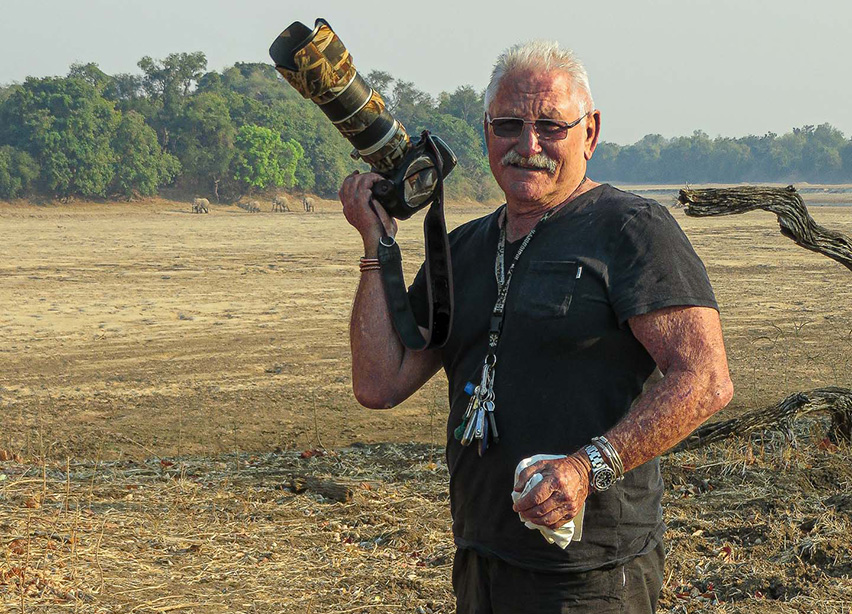About Me – Tim Driman, aka: Gonondo
Gonondo is the Zulu* name given to me by my African staff many years back. It is the generic name given to the “Inyanga”** or medicine person, in a typical, ethnic Zulu village. The Inyanga is highly perceptive, a savvy psychologist, and an excellent judge of behaviour and character. To the rural villagers, these powers are seen as magical, or Mtakathi*** powers. (I am a fluent Zulu linguist, with exceptional, in-depth knowledge of Zulu ethnic culture and their traditions.)
I have grown up spending a lot of time in the bush in South Africa, sometimes venturing as far as Tanzania, Zimbabwe, Zambia, Botswana, Namibia and Mozambique, paying close attention to the various styles of conservation management found in those areas.
Not satisfied with simply observing and enjoying animals, my wife – Yvonne, and I decided that our brains also needed ongoing stimulation, which led to both of us enrolling with Africa Nature Training (www.africanaturetraining.co.za) to study for our FGASA (www.FGASA.co.za) Field Guides qualifications. Originally, we only intended to study the FGASA Level 1, 2 and 3 academic side of things, but after passing the academic examinations, and realising that we did indeed have some brains left, we decided to do a thorough job, which saw us adding the practical game ranger training at the Nkombe Ranger Training Camp situated in the Sabi Sabi Game Reserve, west of Kruger National Park.
No sooner had we both qualified as FGASA Level 1 Field Guides, we enrolled in a post graduate course to become FGASA Trails Guides. Only qualified Field Guides may enroll in this tough course, as it entails guiding guests to face-to-face encounters with Africa’s Big Five animals, while on foot! We both passed the academic examinations “Cum Laude”, and are presently logging up more hours and face-to-face encounters on foot, in various Big Five areas.
I am always available and very keen to photograph and document conservation projects at very short notice, and also to support movie crews who require any “stills” images.
My philosophy of “have camera, will travel”, has enabled me to capitalise on my mobility over the years, and travel extensively around sub-Saharan Africa.
Prior to the year 2000, I used a Mamiya “Rangefinder” film camera to document various freight and transport projects in which my companies were involved, but my keen interest in photography became a passion with the advent of digital cameras at the end of the late 90’s. My very first digital camera was a SONY Mavica, with its floppy disc storage medium, and this really captured my imagination, so when Canon introduced their very first digital SLR – D30, I was hooked!
I was a very loyal Canon shooter for 19 years and had great success with my Canon 1DX MKii; 5D MKiv; 7D MKii: 24mm-105mm f4.0 MKii; 70mm – 200mm f2.8 MKii and the wonderful 200mm – 400mm f4. + built-in 1.4x extender and both MKiii 1.4x and 2x extenders.
However in 2017, SONY burst onto the world photographic stage with their new mirrorless flagship the A9, and their new G Master lenses, which were built specifically for the SONY Alpha range of mirrorless camera bodies.
The specifications and technology of the SONY A9 and the SONY G Master Lenses were so advanced, and so far ahead of my flagship Canon equipment that I just couldn’t ignore this major inflection point in modern electronic image capture. Even though SONY hadn’t come back into South Africa at that stage, I took a leap of faith and imported a SONY A9 and a G Master 70mm – 200mm f2.8 together with a G Master 2x extender. I tested it against my flagship Canon 1DX MKii / 200mm – 400mm f4.0 + built-in 1.4x extender on Carmine Bee-eaters during their 2017 breeding season at Kalizo on the great Zambezi River (Namibian side), and the rest is history.
Today, I believe in keeping pace with technology, and have grown with the Full Frame alpha bodies and G Master lenses.
I have a personal philosophy in which I strongly believe: I give forward by sharing my knowledge with others. Being a gregarious person by nature, I enjoy teaching others, and derive great pleasure watching excited “Eureka” moments when guests and students suddenly “get it!”
*Zulu – An indigenous African tribe from KwaZulu-Natal, the east coast of the region of South Africa.
**Inyanga – The Zulu name given to the “medicine person” who administers natural potions and remedies.
***Mtakathi – The Zulu word for magic.
